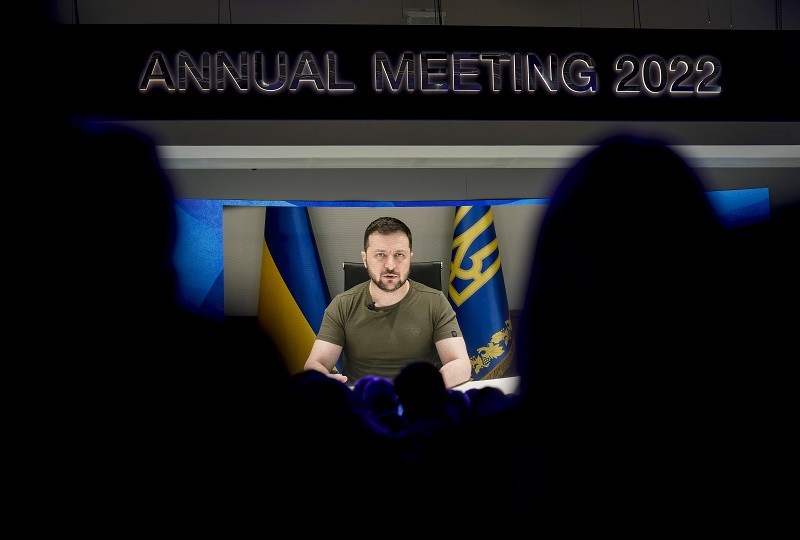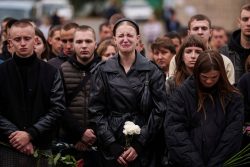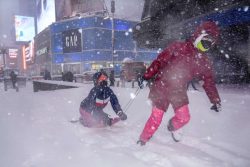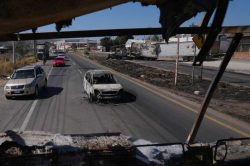
Ukrainian President Volodymyr Zelenskyy displayed on a screen as he addresses the audience from Kyiv on a screen during the World Economic Forum in Davos, Switzerland, on Monday.
18:22 JST, May 26, 2022
DAVOS, Switzerland (AP) — After days of discussions about Russia’s war in Ukraine, a global food crisis, climate change and other hot-button issues, the World Economic Forum’s annual meeting was set to conclude Thursday with one of the highest-profile guests to journey to Davos: German Chancellor Olaf Scholz.
The yearly gathering of elites that was suspended twice over the COVID-19 pandemic has been overshadowed by the war in Ukraine, dousing moods among policymakers but not stopping advocacy groups and business leaders from trying to improve fortunes and — as forum organizers hope — the state of the world.
Ukrainian President Volodymyr Zelenskyy, Foreign Minister Dmytro Kuleba and an array of lawmakers, local officials and business leaders captured the spotlight in-person and virtually to drum up support for their country’s grueling and uncertain campaign to oust Russian invaders who bombed, blasted and barraged their way to seize control of a widening arc of eastern Ukraine since Feb. 24.
Russian President Vladimir Putin’s campaign has drawn international scorn and unsettled his allies, and as a result, Russian envoys from business and government who have been staples at Davos since the end of the Soviet Union weren’t invited this year.
Attention was turning to Scholz’s near-finale address to cap scores of panel discussions, speeches, coffee chats and other meetings in public and private this week – mostly to see if he might try to answer two of Ukraine’s key appeals: for stronger sanctions against Russia and better weapons to help their forces fight.
Kuleba voiced little hope that the war could come to a negotiated end, or even a pause, anytime soon.
The moment Russia will agree to a cease-fire will be the moment it will be one step away from losing the war, he told reporters late Wednesday. “They (the Russians) will agree to a cease-fire with only one purpose: to save themselves from losing the war. Until then, this war will continue.”
Kuleba has pressed for Western powers to supply Ukraine with weapons like multiple-launch rocket systems and pointed to a “saga” about obtaining Gepard tanks from Germany, among other things his government has discussed with Berlin.
We clearly understand that Germany will not be a country that will lead the process of supplying Ukraine with heavy weapons we need, Kuleba said. “Let’s make it clear: If we don’t get heavy weapons, we get killed.”
The upshot of Ukraine’s efforts is to rally countries around a budding democracy with ambitions to join the European Union — the free-world and free-market club — in the face of an onslaught by a Russian regime that clamps down on dissent and centralizes power in one man: Putin.
Meanwhile, a deadly school shooting Tuesday in Texas was on many minds in Davos. More broadly, battles against global warming, soaring costs for food and fuel worldwide, and cyberattacks by hackers from Russia and beyond have exposed how progressive leaders from civil society, corporations and government have struggled to cope in a world facing simultaneous crises.
A key topic has been a food crisis tied to Russia blocking ports in Ukraine, preventing its critical stocks of wheat, barley and sunflower oil from getting to the world and threatening food insecurity in countries in Africa, the Middle East and Asia. The European Union and United States have accused Russia of using food supplies as a weapon and there have been talks of opening secure shipping corridors.
Russian officials are blaming Western sanctions or Ukrainian mines in the sea.
This food crisis is real and we must find solutions, WTO Director-General Ngozi Okonjo-Iweala said on a trade panel.
Davos once again churned up ideas from innovators and officials, but translating those into action could take time — and may not happen at all. The meeting is above all a talkfest, and concrete, high-profile achievements and announcements have been few this year.
Former U.S. Vice President Al Gore, a leading crusader against climate change, briefly railed against failed efforts for gun control in the United States before trumpeting a new system to monitor greenhouse gas emissions by satellite. That will increase needed scrutiny and transparency about the burning of carbon and other planet-warming gases by businesses around the globe, he said.
Gore, who shared a Nobel Peace Prize with the U.N.’s top body on climate science for their work on climate change, pointed to an initiative known as Climate Trace that combines more than 300 satellites with machine learning to create algorithms and zero in on emission hotspots worldwide. It’s expected to release results in October from 500 largest sources of emissions.
We are about to enter an age of radical transparency, he said.
Top Articles in News Services
-

Survey Shows False Election Info Perceived as True
-

Hong Kong Ex-Publisher Jimmy Lai’s Sentence Raises International Outcry as China Defends It
-

Japan’s Nikkei Stock Average Touches 58,000 as Yen, Jgbs Rally on Election Fallout (UPDATE 1)
-

Japan’s Nikkei Stock Average Falls as US-Iran Tensions Unsettle Investors (UPDATE 1)
-

Trump Names Former Federal Reserve Governor Warsh as the Next Fed Chair, Replacing Powell
JN ACCESS RANKING
-

Producer Behind Pop Group XG Arrested for Cocaine Possession
-

Japan PM Takaichi’s Cabinet Resigns en Masse
-

Japan Institute to Use Domestic Commercial Optical Lattice Clock to Set Japan Standard Time
-

Man Infected with Measles Reportedly Dined at Restaurant in Tokyo Station
-

Israeli Ambassador to Japan Speaks about Japan’s Role in the Reconstruction of Gaza






















